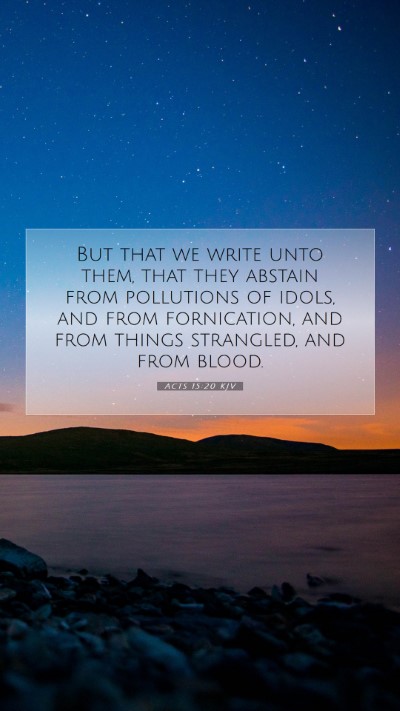Understanding Acts 15:20
Acts 15:20 states: "But that we write unto them, that they abstain from pollutions of idols, and from fornication, and from things strangled, and from blood."
This verse is part of the decision made by the early Church during the Council of Jerusalem. It represents pivotal guidance for Gentile believers regarding conduct and practices that honor God. Here, we will explore its meaning, interpretations, and significance using insights from renowned public domain commentaries by Matthew Henry, Albert Barnes, and Adam Clarke.
Bible Verse Meaning
The essence of acts 15:20 focuses on the prohibition of specific practices that were contrary to the moral and spiritual standards set by God. These directives were not about mere ritual observance but emphasized the heart of the believers in their relationships with God and others.
Insights from Commentaries
-
Matthew Henry's Commentary
Henry interprets this directive as a means to maintain spiritual purity among the early followers of Christ, especially the Gentiles. He emphasizes that abstaining from "pollutions of idols" refers to avoiding any practices associated with idolatry, which would have been prevalent in the Gentile cultures. Such practices were understood to corrupt the conscience and dilute the believer's faith.
-
Albert Barnes' Notes
Barnes explains that the term "fornication" in this context encompasses all forms of sexual immorality. He asserts that the apostles aimed to guide the church towards a lifestyle reflecting holiness, which was necessary for confirming their faith and integrity as followers of Jesus Christ. He also notes that the prohibitions were partly to ensure that new believers would not be a stumbling block for others within the community.
-
Adam Clarke's Commentary
Clarke elaborates on the cultural context of "things strangled" and "blood," explaining that these practices were not only a matter of dietary laws but represented deeper spiritual truths. In the Jewish tradition, blood was associated with life and sanctity. Thus, the prohibition here served not just as a cultural boundary but as a reflection of respecting God's commandments relating to life and purity.
Importance of the Message
Acts 15:20 stands as a pivotal verse in establishing guidelines that unite the early church across cultural lines. The message serves as a reminder that faithfulness to God involves active avoidance of practices that compromise one's spiritual integrity. These instructions also formed a basis for the moral compass guiding early Christians in diverse settings.
Applying the Verse Today
In modern application, Acts 15:20 encourages believers to examine their cultural practices and faith expressions, ensuring they align with the principles of holiness and truth. This calls for thoughtful engagement with one’s surroundings, discerning what influences support or hinder spiritual growth.
Cross References
- Leviticus 17:10-14 - Discusses the significance of blood and dietary restrictions within the Law.
- 1 Corinthians 8:4-13 - Paul addresses food offered to idols and the conscience of believers.
- 1 Thessalonians 4:3-5 - Encourages believers to abstain from fornication and live in holiness.
Conclusion
Acts 15:20 gives insight into the early church's struggle to forge a distinctive identity that honored God while embracing diverse backgrounds. By analyzing this verse through the lens of established commentaries, modern-day believers gain valuable Bible study insights that can guide their understanding of Scripture and personal conduct.
The careful interpretation and application of such scriptures through an engaging Bible study approach can foster deeper spiritual growth and community integrity.


